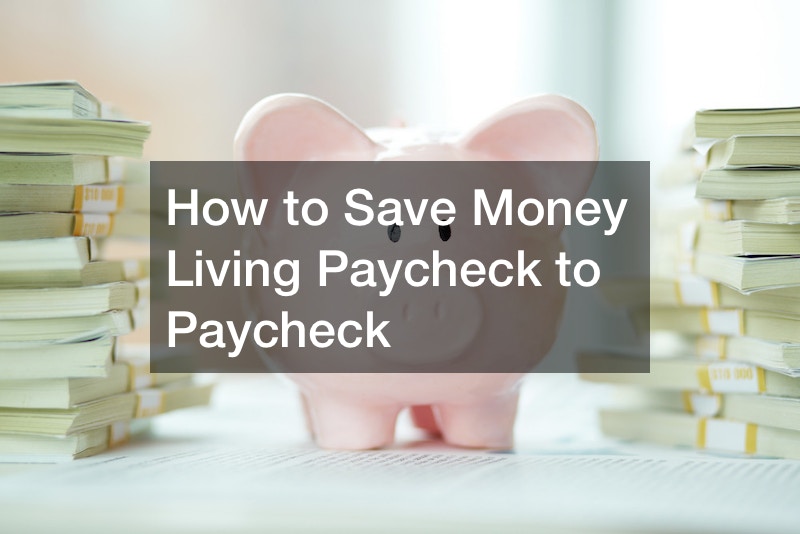
Saving money can be difficult if you’re living paycheck to paycheck. Unfortunately, most Americans are in this situation where the money comes in with a paycheck but goes right out with bills, debts, and other expenses.
It feels like there’s probably no room left in your budget for some savings. However, despite how difficult it may seem, there is always scope for savings.
Here’s how to save money living paycheck to paycheck.
Create a Budget Plan

One of the best ways how to save money living paycheck to paycheck is to create a detailed budget plan.
First, cover the necessities like rent, utilities, transportation, grocery, etc. Then, you can dial down any non-essential or discretionary spending to help save money. This includes reducing your food budget (eating out less or shopping for groceries at a less expensive store).
If you’re using your cable connection sparingly, consider cutting it out temporarily, as with any other subscriptions or memberships that aren’t necessary.
Any tax refunds or unexpected bonuses can be put into savings right away or used to clear any existing debts faster.
Open a Savings Account
Another equally good way how to save money living paycheck to paycheck is with a savings account.
It helps to have a dedicated bank account to channel your savings. A savings account that accumulates a reasonable interest rate and with limited access (to avoid easily transferring your funds to your checking account) is a good option.
Upon opening a savings account and making the initial minimum deposit, you can put in any amount you can manage each month.
Try depositing a small amount into your savings account with each paycheck before using the remaining money. Whether it’s $5 or $25, you’ll save at least some of your paycheck.
Automate Your Savings
Saving money can be difficult if you’re living paycheck to paycheck. Unfortunately, most Americans are in this situation where the money comes in with a paycheck but goes right out with bills, debts, and other expenses.
It feels like there’s probably no room left in your budget for some savings. However, despite how difficult it may seem, there is always scope for savings.
Here’s how to save money living paycheck to paycheck.
Create a Budget Plan

One of the best ways how to save money living paycheck to paycheck is to create a detailed budget plan.
First, cover the necessities like rent, utilities, transportation, grocery, etc. Then, you can dial down any non-essential or discretionary spending to help save money. This includes reducing your food budget (eating out less or shopping for groceries at a less expensive store).
If you’re using your cable connection sparingly, consider cutting it out temporarily, as with any other subscriptions or memberships that aren’t necessary.
Any tax refunds or unexpected bonuses can be put into savings right away or used to clear any existing debts faster.
Open a Savings Account
Another equally good way how to save money living paycheck to paycheck is with a savings account.
It helps to have a dedicated bank account to channel your savings. A savings account that accumulates a reasonable interest rate and with limited access (to avoid easily transferring your funds to your checking account) is a good option.
Upon opening a savings account and making the initial minimum deposit, you can put in any amount you can manage each month.
Try depositing a small amount into your savings account with each paycheck before using the remaining money. Whether it’s $5 or $25, you’ll save at least some of your paycheck.
Automate Your Savings
Of the many ways how to save money living paycheck to paycheck, you can set up an automated payment into your savings account. It doesn’t matter, even if it is as low as $10 – $20. The dollars accumulate over time, little by little, to help out in the long run.
You can also automate your monthly bill payments, ensuring you avoid any late charges. If you plan to automate, you’ll need to plan ahead with your budget and paydays to ensure the money required for the bills or savings is available when needed. If not, there’s the risk of an overdraft fee.
It helps to create a buffer within your checking account to avoid overdrafts. The buffer is the amount you commit not to spend in your checking account. That small margin helps in avoiding expensive bank fees and adjusting finance automation.
Boost Your Income
You could manage things with your current income by following ways how to save money living paycheck to paycheck. But, if you find it extremely difficult to save on your existing income, you could also consider taking on some extra work to earn some extra money to help save some.
This could mean extra hours at work (if you’re getting paid hourly) or going for a part-time job. If you have a salaried position, you could negotiate for a raise or even a promotion to a higher-paying role (if you feel you deserve it).
Taking up a side hustle or starting a business are some options you could consider. It isn’t uncommon to keep your regular job and take up a side gig for some extra income to help you stay on top of your finances and needs.
Choose a side gig based on your skills/interests and how much time you can commit. While babysitting, walking your neighbors’ dogs, or cutting lawns will help, online freelancing is a popular option. Several fields require freelancers – content development, video editing, software development, app development, etc.
Remember, this is extra money you’re earning apart from your regular income. Therefore, it must be utilized wisely for saving and paying off debts or bills.
Dealing With Debts
Regardless of the size of the debt – small or significant, saving money while managing debt payments can get complicated. However, there are ways how to save money living paycheck to paycheck and managing debts.
It’s best to pay off as much debt as possible before you begin saving. There are loan assistance and forgiveness programs, or forbearance and deferment for student loans.
Alternatively, you could opt to refinance your debts at lower interest rates. Even a slight interest rate reduction can help you deal with debts easily and help you start saving money sooner.
For mortgages, you could look into refinancing (which involves various fees). First, consult with a lender to check if you’re eligible for a refinance, which mainly depends on your credit score and debt-to-income ratio. If you can successfully obtain a reduced rate, ensure that your savings outweigh the associated costs.
Using Technology to Help You Save Money

If you find it difficult to save money by yourself, some apps can help you set a savings goal and also create rules triggering an automatic deposit into your app account.
The Qapital app is a good example. It rounds up any purchase to the nearest dollar and deposits the difference. While there is no interest earned with the account, it’s possible to withdraw your money any time to transfer to your savings account.
Negotiate Your Bills
Among the many ways how to save money living paycheck to paycheck, one significant factor is to cut down on your monthly bills. This includes credit cards, cable, internet, utilities, insurance, phone, etc.
To start cutting back, browse through all your existing plans and check for providers with lower rates, where applicable. Then, cut down on your electric, water, and gas usage to lower your utility bills, even by a small amount. If your utility provider offers a free energy audit (where they inspect your home and suggest ways to be energy-efficient and save money), opt for it.
Among all the different debts, credit card debt can be easily avoided. Try a balance transfer if you have multiple accounts with credit card debts. Find a lower-interest-rate credit card and transfer all your debts onto the new credit card.
Bankruptcy Counseling Services
You may have taken on too many debts, like consumer or student debt, or you’ve managed your finances poorly. If you find yourself in this state, bankruptcy might be the only realistic option to help you get out of debt and start afresh. This counts as one of the ways how to save money living paycheck to paycheck.
Since filing for bankruptcy with a bankruptcy lawyer is a legal process, it must be done through the court system. However, there are bound to be long-term consequences, like remaining on your credit report for the next seven to ten years. Regardless, it’s designed to relieve consumers with large debts and improve their financial position.
The six types of bankruptcy defined by the United States Bankruptcy Code can be categorized under Chapter 7 or Chapter 13.
Bankruptcy Chapter 7
This is the liquidation bankruptcy that helps wipe out debts. It’s beneficial for those unable to pay off their monthly debts.
It involves a court-appointed trustee selling or liquidating your assets for money that gets distributed to the creditors. Some assets, like household furnishings and your vehicle, may be exempt. Upon completing Chapter 7, you’re released from all the debts covered by the bankruptcy case.
Bankruptcy Chapter 13
Otherwise known as a wage earner’s plan, Chapter 13 of the Bankruptcy Code is intended for debt adjustment for individuals with a regular income. It allows people in debt to keep their property while also paying off their debts over a specified time period (usually within three to five years).
The most significant advantage of Chapter 13 is providing the opportunity for an individual to save their home from foreclosure. Also, individuals can reschedule their secured debts and extend them, thereby lowering the payments.
A special provision of Chapter 13 protects any third party that can be held liable alongside the debtor for consumer debts. It is also similar to a consolidation loan wherein the individual pays the plan’s payments to a Chapter 13 trustee, to be distributed to the creditors. With Chapter 13 protection, there isn’t any direct contact between the individuals under debt and the creditors.
Bankruptcy Lawyer
There are several law firms where you can contact bankruptcy lawyers to help you through the legal process of filing for bankruptcy. A bankruptcy lawyer or attorney, whether in a law firm or doing business independently, must be qualified (with a law degree) and licensed to practice in the state.
Consulting with a lawyer can help with advice on whether you must file for bankruptcy and, if yes, which type you must file for. You’ll also be advised about the entire legal process, how it works, the forms to fill in, the debts that can be eliminated or reduced, and what assets you can retain once the case is complete.
If you’re confident you’d like to file for bankruptcy, it would be best to contact a bankruptcy lawyer to help avoid any legal mistakes that could lead to long-term financial consequences.
Life Insurance Policy

If you’re wondering ‘how to save money living paycheck to paycheck’, a smart way is with life insurance that also secures your family’s future. With a life insurance policy, the named beneficiaries receive the proceeds income tax-free when you pass away.
Life Insurance Trust
The life insurance payout might not be exempt from estate tax. For this purpose, it is recommended you consult with a life insurance trust company for a trust to own your life insurance policy instead of owing it directly.
The two types of trusts are revocable trust and irrevocable trust.
With a revocable trust, you’ll have sufficient control and flexibility. However, the life insurance’s death benefit value gets included in your gross estate to account for estate tax. As for irrevocable trusts, you won’t have significant control, and the assets won’t be included in your gross estate, being exempt from estate tax.
Life insurance proceeds are usually protected by state law, restricting creditors from attaching to it. Additionally, if the listed beneficiaries have any creditors, the creditors can attack any distributions. But, with the right provisions, the beneficiaries can be protected from creditors.
Insurance Broker
If you opt for insurance (home, vehicle, health, life, etc.), you could choose one through an agent who works for an insurance company or go with an insurance broker. The latter might be a better option for those living paycheck to paycheck.
An affordable insurance broker will help you select a suitable insurance policy based on your assets and budget by shopping around with multiple insurance companies on your behalf. However, you must ensure such professionals are genuine and have a valid license to work in their province.
Insurance Adjuster
Insurance adjusters or claims adjusters usually represent the insurance company and provide their services to determine whether anybody claiming a loss is payable as per the insurance policy’s terms.
Any loss, including physical injury or property damage, requires insurance adjusters who work for major insurance companies or as independent contractors representing claimants.
You can hire a public insurance adjuster if your home is damaged in a windstorm or a fire accident. An insurance adjuster evaluates the property loss and helps you file insurance claims.
Although hiring such a licensed professional will require a fee, you’ll end up saving a lot of money, since the public adjuster ensures your insurance company makes a full payment they’re responsible for, depending on your coverage.
Stay Focused and Patient
Now that you know how to save money living paycheck to paycheck, you must realize that it takes time, effort, and a lot of patience.
Developing a plan, sticking to your budget plan, and staying focused is crucial to making progress in building up your savings. While it could take longer, remember that even small, regular contributions make a tremendous difference.


Of the many ways how to save money living paycheck to paycheck, you can set up an automated payment into your savings account. It doesn’t matter, even if it is as low as $10 – $20. The dollars accumulate over time, little by little, to help out in the long run.
You can also automate your monthly bill payments, ensuring you avoid any late charges. If you plan to automate, you’ll need to plan ahead with your budget and paydays to ensure the money required for the bills or savings is available when needed. If not, there’s the risk of an overdraft fee.
It helps to create a buffer within your checking account to avoid overdrafts. The buffer is the amount you commit not to spend in your checking account. That small margin helps in avoiding expensive bank fees and adjusting finance automation.
Boost Your Income
You could manage things with your current income by following ways how to save money living paycheck to paycheck. But, if you find it extremely difficult to save on your existing income, you could also consider taking on some extra work to earn some extra money to help save some.
This could mean extra hours at work (if you’re getting paid hourly) or going for a part-time job. If you have a salaried position, you could negotiate for a raise or even a promotion to a higher-paying role (if you feel you deserve it).
Taking up a side hustle or starting a business are some options you could consider. It isn’t uncommon to keep your regular job and take up a side gig for some extra income to help you stay on top of your finances and needs.
Choose a side gig based on your skills/interests and how much time you can commit. While babysitting, walking your neighbors’ dogs, or cutting lawns will help, online freelancing is a popular option. Several fields require freelancers – content development, video editing, software development, app development, etc.
Remember, this is extra money you’re earning apart from your regular income. Therefore, it must be utilized wisely for saving and paying off debts or bills.
Dealing With Debts
Regardless of the size of the debt – small or significant, saving money while managing debt payments can get complicated. However, there are ways how to save money living paycheck to paycheck and managing debts.
It’s best to pay off as much debt as possible before you begin saving. There are loan assistance and forgiveness programs, or forbearance and deferment for student loans.
Alternatively, you could opt to refinance your debts at lower interest rates. Even a slight interest rate reduction can help you deal with debts easily and help you start saving money sooner.
For mortgages, you could look into refinancing (which involves various fees). First, consult with a lender to check if you’re eligible for a refinance, which mainly depends on your credit score and debt-to-income ratio. If you can successfully obtain a reduced rate, ensure that your savings outweigh the associated costs.
Using Technology to Help You Save Money
If you find it difficult to save money by yourself, some apps can help you set a savings goal and also create rules triggering an automatic deposit into your app account.
The Qapital app is a good example. It rounds up any purchase to the nearest dollar and deposits the difference. While there is no interest earned with the account, it’s possible to withdraw your money any time to transfer to your savings account.
Negotiate Your Bills
Among the many ways how to save money living paycheck to paycheck, one significant factor is to cut down on your monthly bills. This includes credit cards, cable, internet, utilities, insurance, phone, etc.
To start cutting back, browse through all your existing plans and check for providers with lower rates, where applicable. Then, cut down on your electric, water, and gas usage to lower your utility bills, even by a small amount. If your utility provider offers a free energy audit (where they inspect your home and suggest ways to be energy-efficient and save money), opt for it.
Among all the different debts, credit card debt can be easily avoided. Try a balance transfer if you have multiple accounts with credit card debts. Find a lower-interest-rate credit card and transfer all your debts onto the new credit card.
Bankruptcy Counseling Services
You may have taken on too many debts, like consumer or student debt, or you’ve managed your finances poorly. If you find yourself in this state, bankruptcy might be the only realistic option to help you get out of debt and start afresh. This counts as one of the ways how to save money living paycheck to paycheck.
Since filing for bankruptcy is a legal process, it must be done through the court system. However, there are bound to be long-term consequences, like remaining on your credit report for the next seven to ten years. Regardless, it’s designed to relieve consumers with large debts and improve their financial position.
The six types of bankruptcy defined by the United States Bankruptcy Code can be categorized under Chapter 7 or Chapter 13.
Bankruptcy Chapter 7
This is the liquidation bankruptcy that helps wipe out debts. It’s beneficial for those unable to pay off their monthly debts.
It involves a court-appointed trustee selling or liquidating your assets for money that gets distributed to the creditors. Some assets, like household furnishings and your vehicle, may be exempt. Upon completing Chapter 7, you’re released from all the debts covered by the bankruptcy case.
Bankruptcy Chapter 13
Otherwise known as a wage earner’s plan, Chapter 13 of the Bankruptcy Code is intended for debt adjustment for individuals with a regular income. It allows people in debt to keep their property while also paying off their debts over a specified time period (usually within three to five years).
The most significant advantage of Chapter 13 is providing the opportunity for an individual to save their home from foreclosure. Also, individuals can reschedule their secured debts and extend them, thereby lowering the payments.
A special provision of Chapter 13 protects any third party that can be held liable alongside the debtor for consumer debts. It is also similar to a consolidation loan wherein the individual pays the plan’s payments to a Chapter 13 trustee, to be distributed to the creditors. With Chapter 13 protection, there isn’t any direct contact between the individuals under debt and the creditors.
Bankruptcy Lawyer
There are several law firms where you can contact bankruptcy lawyers to help you through the legal process of filing for bankruptcy. A bankruptcy lawyer or attorney, whether in a law firm or doing business independently, must be qualified (with a law degree) and licensed to practice in the state.
Consulting with a lawyer can help with advice on whether you must file for bankruptcy and, if yes, which type you must file for. You’ll also be advised about the entire legal process, how it works, the forms to fill in, the debts that can be eliminated or reduced, and what assets you can retain once the case is complete.
If you’re confident you’d like to file for bankruptcy, it would be best to contact a bankruptcy lawyer to help avoid any legal mistakes that could lead to long-term financial consequences.
Life Insurance Policy
If you’re wondering ‘how to save money living paycheck to paycheck’, a smart way is with life insurance that also secures your family’s future. With a life insurance policy, the named beneficiaries receive the proceeds income tax-free when you pass away.
Life Insurance Trust
The life insurance payout might not be exempt from estate tax. For this purpose, it is recommended you consult with a life insurance trust company for a trust to own your life insurance policy instead of owing it directly.
The two types of trusts are revocable trust and irrevocable trust.
With a revocable trust, you’ll have sufficient control and flexibility. However, the life insurance’s death benefit value gets included in your gross estate to account for estate tax. As for irrevocable trusts, you won’t have significant control, and the assets won’t be included in your gross estate, being exempt from estate tax.
Life insurance proceeds are usually protected by state law, restricting creditors from attaching to it. Additionally, if the listed beneficiaries have any creditors, the creditors can attack any distributions. But, with the right provisions, the beneficiaries can be protected from creditors.
Insurance Broker
If you opt for insurance (home, vehicle, health, life, etc.), you could choose one through an agent who works for an insurance company or go with an insurance broker. The latter might be a better option for those living paycheck to paycheck.
An affordable insurance broker will help you select a suitable insurance policy based on your assets and budget by shopping around with multiple insurance companies on your behalf. However, you must ensure such professionals are genuine and have a valid license to work in their province.
Insurance Adjuster
Insurance adjusters or claims adjusters usually represent the insurance company and provide their services to determine whether anybody claiming a loss is payable as per the insurance policy’s terms.
Any loss, including physical injury or property damage, requires insurance adjusters who work for major insurance companies or as independent contractors representing claimants.
You can hire a public insurance adjuster if your home is damaged in a windstorm or a fire accident. An insurance adjuster evaluates the property loss and helps you file insurance claims.
Although hiring such a licensed professional will require a fee, you’ll end up saving a lot of money, since the public adjuster ensures your insurance company makes a full payment they’re responsible for, depending on your coverage.
Stay Focused and Patient
Now that you know how to save money living paycheck to paycheck, you must realize that it takes time, effort, and a lot of patience.
Developing a plan, sticking to your budget plan, and staying focused is crucial to making progress in building up your savings. While it could take longer, remember that even small, regular contributions make a tremendous difference.



